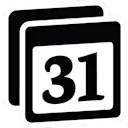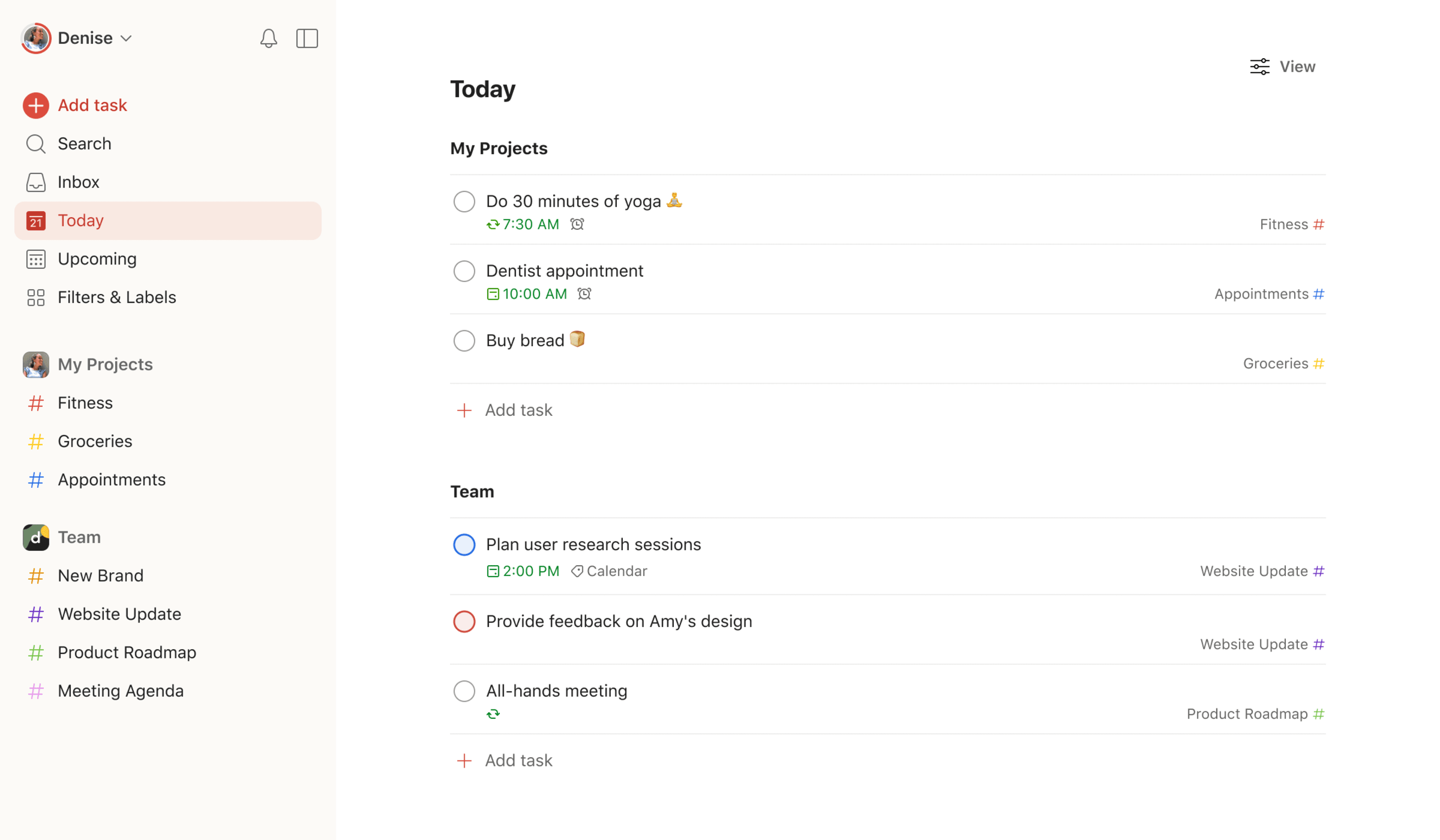Back to all comparisons
Todoist vs Notion Calendar
Comprehensive comparison to help you choose the right tool for your needs
Todoist
4.5
Todoist is a task management tool. It enables users to manage tasks, set priorities, and track deadlines across various devices. Its features include task categorization, reminders, and project collaboration, making it suitable for both personal and team productivity.
Premium at $4 per month, paid annually
Visit Website 
Notion Calendar
4.5
Notion Calendar is a comprehensive tool for managing time and work together. It integrates seamlessly with Google Calendar, allowing you to view and manage events alongside project timelines in Notion. The calendar offers built-in scheduling, time zone support, and a modern design, making it ideal for both personal and professional use. It's available in multiple languages and can be accessed on various platforms.
Free
Visit Website Quick Summary
Todoist Strengths
- Task Management: Create, track, and complete tasks with Todoist. Set deadlines, priorities, and reminders for each task.
- Project Organization: Group your tasks into different projects like work, personal, or travel plans. Break them down into smaller subtasks and sections for better organization.
- Labels and Filters: Use labels to categorize your tasks. Filters help you find tasks quickly, like those due today or high-priority ones.
- Recurring Tasks: Set up tasks that repeat regularly, like daily, weekly, or monthly.
Notion Calendar Strengths
- Google Calendar Integration: This feature allows users to seamlessly connect their Google Calendar with Notion, enabling efficient management of events and meetings within a unified interface. It simplifies scheduling and updating events across platforms.
- Meeting Booking Functionality: Notion Calendar offers a user-friendly interface for scheduling meetings. This includes options for setting up recurring meetings, sending invitations, and managing RSVPs, streamlining the meeting planning process.
- Notion Page Connectivity: Users can link calendar events to specific Notion pages, facilitating better organization and access to related notes, tasks, or documents associated with an event. This integration enhances productivity and project management.
- Video Conferencing Integration: The calendar supports adding video conferencing links from popular platforms like Zoom and Google Meet directly into event details. This feature is particularly useful for remote teams and virtual meetings, offering convenience and efficiency.
Todoist Screenshot

Notion Calendar Screenshot
:format(webp)/cdn.vox-cdn.com/uploads/chorus_asset/file/25231452/NotionCalendar_Asset__1_.png)
Feature Comparison
| Feature | Todoist | Notion Calendar |
|---|---|---|
| Platforms | Android, iOS, iPad, macOS, Windows, Android Wear, and Apple Watch | macOS, iOS, Android, Web, Windows |
| Integrations | IFTTT, Alexa, Google Calendar, Slack, Gmail, Zapier, Fantastical, Outlook, Chrome, Trello Power-Up | Notion, Zoom, Google Calendar |
| Calendar | No Calendar View | Yes |
| Task Management | Labels, Filters, Priority levels, Recurring tasks | No |
| Natural Language Processing | Yes | No |
| Analytics | Yes | No |
| Time Blocking | Not Available | Yes |
| Time Zones | Yes | Yes |
| Scheduler | Yes | Yes |
| Notifications | Yes | Yes |
| Pricing | Premium at $4 per month, paid annually | Free |
| Customer Support | Average | Average |
Video Overview
Todoist Video
Notion Calendar Video
Todoist Overview
Todoist stands out in the productivity tool landscape with its straightforward yet powerful approach to task management. Renowned for its clean design and user-friendly interface, Todoist simplifies the process of managing daily tasks and long-term projects. It allows users to create, organize, and prioritize tasks with ease, making it an ideal choice for individuals and teams alike. With features like recurring tasks, reminders, and progress tracking, Todoist effectively helps users stay on top of their responsibilities.
Pricing Details
(i) Free Version: Suitable for basic task management needs. (ii) Pro Plan: Typically priced around $3 to $5 per month when billed annually. (iii) Business Plan: Generally costs about $5 to $10 per user per month when billed annually. Todoist offers a flexible pricing model catering to a range of users, from individuals to business teams. The free version is a major draw for users with basic requirements.
Notion Calendar Overview
The Notion Calendar, previously known as Cron Calendar, is a calendar application designed for managing meetings and events. It integrates closely with Notion documents, allowing users to connect their Google calendars, schedule meetings, manage events, and collaborate on upcoming events. It supports video conferencing links for platforms like Zoom and Google Meet, offers color coding for time blocking, and has deep integrations with Notion databases.
Pricing Details
Notion Calendar is free to use for Notion users
Todoist Key Features
Task Management: Create, track, and complete tasks with Todoist. Set deadlines, priorities, and reminders for each task.
Project Organization: Group your tasks into different projects like work, personal, or travel plans. Break them down into smaller subtasks and sections for better organization.
Labels and Filters: Use labels to categorize your tasks. Filters help you find tasks quickly, like those due today or high-priority ones.
Recurring Tasks: Set up tasks that repeat regularly, like daily, weekly, or monthly.
Team Collaboration: Share projects with others, assign tasks, and work together within the app.
Works Everywhere and Easy to Use: Use Todoist on web browsers, desktops (Windows, macOS), and mobile apps (iOS, Android). The interface is simple, making it easy to start using right away.
Notion Calendar Key Features
Google Calendar Integration: This feature allows users to seamlessly connect their Google Calendar with Notion, enabling efficient management of events and meetings within a unified interface. It simplifies scheduling and updating events across platforms.
Meeting Booking Functionality: Notion Calendar offers a user-friendly interface for scheduling meetings. This includes options for setting up recurring meetings, sending invitations, and managing RSVPs, streamlining the meeting planning process.
Notion Page Connectivity: Users can link calendar events to specific Notion pages, facilitating better organization and access to related notes, tasks, or documents associated with an event. This integration enhances productivity and project management.
Video Conferencing Integration: The calendar supports adding video conferencing links from popular platforms like Zoom and Google Meet directly into event details. This feature is particularly useful for remote teams and virtual meetings, offering convenience and efficiency.
Color Coding and Time Blocking: Notion Calendar allows users to color code their events for better visual organization. The time blocking feature helps in allocating specific time slots for tasks, aiding in time management and daily planning.
Cross-Platform Availability: It is accessible on various platforms including iOS, Windows, Mac, and the web. This cross-platform availability ensures users can manage their calendars and stay organized regardless of the device they are using.
Conclusion: Which Tool Should You Choose?
Both Todoist and Notion Calendar offer unique features and benefits for productivity and workflow management. The best choice depends on your specific needs, team size, and workflow preferences.
Choose Todoist if:
- Task Management: Create, track, and complete tasks with Todoist. Set deadlines, priorities, and reminders for each task.
- Project Organization: Group your tasks into different projects like work, personal, or travel plans. Break them down into smaller subtasks and sections for better organization.
- Labels and Filters: Use labels to categorize your tasks. Filters help you find tasks quickly, like those due today or high-priority ones.
Choose Notion Calendar if:
- Google Calendar Integration: This feature allows users to seamlessly connect their Google Calendar with Notion, enabling efficient management of events and meetings within a unified interface. It simplifies scheduling and updating events across platforms.
- Meeting Booking Functionality: Notion Calendar offers a user-friendly interface for scheduling meetings. This includes options for setting up recurring meetings, sending invitations, and managing RSVPs, streamlining the meeting planning process.
- Notion Page Connectivity: Users can link calendar events to specific Notion pages, facilitating better organization and access to related notes, tasks, or documents associated with an event. This integration enhances productivity and project management.